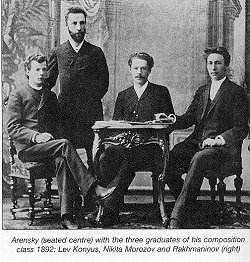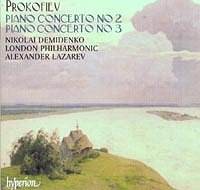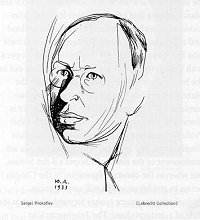TANEYEV FESTIVAL (23 January, Wigmore Hall)
Mikhail Pletnev piano
Pekka Kuusisto violin
Vadim Repin violin
Lawrence Power viola
Steven Isserlis cello
Daniel Müller-Schott celloGLAZUNOV String Quintet in A op 39
ARENSKY String Quartet in A minor op 35a for violin, viola & 2 cellos
PHILHARMONIA ORCHESTRA (22 January, RFH)
Yevgeny Svetlanov - conductor
Nikolai Demidenko - piano
GLINKA Overture, Ruslan & Ludmilla
PROKOFIEV Piano Concerto No 2
RACHMANINOV Symphony No 2These two consecutive evenings made a telling contrast. The 46 min Taneyev Piano Quintet (1910) - composed at the time of The Firebird and Scriabin's Prometheus - did not persuade me, once again, that this worthy, academic and backward-looking composer, who taught composition to the grandfather of the Festival's Artistic Director, Steven Isserlis, merits revival or our special attention. Its material, subjected to elaborate contrapuntal development, is unmemorable and is often over-inflated, especially in the huge first movement (over a quarter of an hour long) and Taneyev's tendency towards massive perorations brought embarrassed smiles, albeit with an ovation at the end. The scherzo is worth rescuing as an encore (and was played again as such) and it benefited from Mikhail Pletnev's quicksilver pianism. That apart, the opportunity to hear this great pianist in the intimacy of the Wigmore Hall (which may have explained that evening being sold out) was largely wasted, despite enthusiastic advocacy for the quintet by all concerned. Glazunov's String Quintet was likewise unrewarding, with an ill matched ad hoc group of string players (these arrangements are usually described as "X and Friends") dominated by Vadim Repin, not in best form, his Strad sounding more suitable for concerto work.
The most original and best music, and the best played, was Arensky's memorial string quartet Op.35 (1892), with variations on Tchaikovsky's children's song Legend, and the conjunction of an Orthodox Requiem theme with the Russian folk song familiar from Beethoven's Razumovsky No 2 quartet. Pekka Kuusitsto led, with Lawrence Power (the redoubtable violist of the Nash Ensemble) and the two cellos in the safe hands of Isserlis & Daniel Müller-Schott. Hear it sympathetically played and recorded by The Raphael Ensemble, coupled with Tchaikovsky's Souvenir de Florence on Hyperion CDA66648.

The chamber music ideal of responsive ensemble, musicians breathing and phrasing as one, was better realised by the Philharmonia Orchestra the previous night, guided in expressive rubato by the hands and fluttering fingers (no baton) of Evgeny Svetlanov. His minimal, telling gestures suggested thorough rehearsal and trusting rapport with the players. I had always thought of the ubiquitous Ruslan & Ludmilla overture as an orchestral visiting card or encore show piece, but here it was Glinka's musical, compositional virtuosity which was celebrated by judicious balancing of orchestral sections and sharing of emphases.
To play Prokofiev's fiendishly difficult four movement 2nd Concerto at all is a cause for wonderment. To be called in to play it 'at extremely short notice' (i.e. one day!), and to do so by memory, beggars belief, leaving ten clumsy typing fingers powerless to convey the miracle achieved by Nikolai Demidenko, brought in to replace Arcadi Volodos, the programme unchanged and a capacity audience not left feeling in the least cheated.
How does a pianist's mind and memory have the capacity to encompass and absorb such complexity and then transmit it all, with subtlest nuance through his fingers; an almost incomprehensible triumph of the human organism at its highest. Especially memorable was the colossal first movement 'cadenza', a misnomer for a vast proliferating solo section which needs to be both seen and heard, with the orchestra and conductor sitting very patiently as if Prokofiev the composer-pianist had become so absorbed that for a while he had forgotten their existence completely. This appearance erased an unhappy experience some years back when Demidenko, human and variable as we all are, gritted his teeth and gave a dour recital on a poor piano in an unsuitable, over-resonant hall in Croydon's museum - on 22 January with Svetlanov at RFH he was a great amongst greats. The balance between piano and orchestra was ideal (how rarely is it so in studio concerto recordings?) and the additional element of risk added a frisson of excitement.
Demidenko has an extensive Hyperion discography and his 1995 recording of Prokofiev's Concertos 2 & 3, with Alexander Lazarev & the LPO (CDA66858), can be recommended - not least for Robert Matthew-Walker's illuminating notes; 'the Second Concerto bears the same relationship to the Third as does Rachmaninov's Third to his Second - in each instance the larger composition may be regarded as the finer work of art, while the shorter will always be the more popular',. Finally another Rachmaninov Second, the symphony, expansive and leisurely under Svetlanov; wonderful to hear again, though for me, not too often. The whole evening a live music experience at the highest level.
Peter Grahame Woolf



 Return to:
Return to: